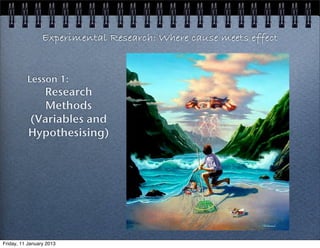
Lesson 1 research methods (variables & hypothesis)
- 1. Experimental Research: Where cause meets effect Lesson 1: Research Methods (Variables and Hypothesising) Friday, 11 January 2013
- 2. Objectives: Lesson 1 Outline the scientific method in psychological research • Identify variables including the dependent, independent, extraneous and confounding variables • Construct a research and operational hypothesis of a research question Friday, 11 January 2013
- 3. Characteristics of an experiment • IV is the variable selected and tested by the researcher to assess effects on the DV (i.e participants responses) • It is assumed that changes in the DV will result after exposure to the IV. • IV and potential unwanted variables (e.g extranious variables) are controlled • Use of random allocation of participants to different conditions (groups) ensures uniform distributed participant characteristics that can affect the DV. Friday, 11 January 2013
- 4. Variables Independent variable – the variable that is changed by the experimenter, interested in its effect. We want to see the effect of the IV on the DV Dependent Variable – measures the effect of the IV, see if the IV has effected the DV Friday, 11 January 2013
- 5. Activity: Research Question: Does drinking alcohol effect driving? Identify the IV and DV Write a research hypothesis Friday, 11 January 2013
- 6. Experimental group and Control group Experimental group: Participants exposed to the treatment condition, i.e the IV manipulation. Control group: Participants not exposed to the IV manipulation. Friday, 11 January 2013
- 7. The Research Hypothesis Hypothesis – a testable prediction relating to the outcome of the research being conducted, a prediction that one variable (IV) will effect another variable (DV) in a certain way. Friday, 11 January 2013
- 8. Example Research Question: Does smoking marijuana effect driving performance? Independent Variable - smoking marijuana Dependent Variable - driving performance It was hypothesised that participants who smoke marijuana will perform worse on a driving test as compared to participants who have not smoked marijuana Friday, 11 January 2013
- 9. Operationalisation of Variables Variables that need to be operationalised Smoking Marijuana Driving Performance The population – who we are testing Operational Definitions Smoking Marijuana – smoking one joint containing 500 milligrams of pure marijuana (not mixed with tobacco) 20 minutes before taking a driving test Driving Performance -% score on VIC Roads, “Are you Road Ready?”driving simulator Population - Victorian drivers aged 18 – 25 Friday, 11 January 2013
- 10. The Operational Hypothesis It was hypothesised that Victorian drivers aged 18 – 25 who have smoked marijuana (smoking one joint containing 500 milligrams of pure marijuana 20 minutes before taking a driving test) will perform worse on a driving test (obtain a lower % score on the VIC Roads “Are you Road Ready?” driving simulator) compared to participants who have not smoked marijuana. Note: Not required according to VCAA - however you do need to be able to operationalise the variables!! Friday, 11 January 2013
- 11. Activity: Research Question: Does drinking red cordial make children hyperactive? Operationalise the independent and dependent variables Friday, 11 January 2013
- 12. Extraneous and Confounding Variables Extraneous Variable: Any variable, other than the IV, that can cause a change in the DV and therefore affect the results of an experiment in an unwanted way. An extraneous variable may become a confounding variable. Confounding variable: Any variable, other than the IV, that is uncontrolled and allowed to change together with the IV, thereby having an unwanted effect on the DV Friday, 11 January 2013
- 13. Watch Clip Below Summary Friday, 11 January 2013
- 14. Activity: 1)Identify one extraneous variable. 2)Identify an ethical breach in the experiment. Friday, 11 January 2013
- 15. Revision Do drivers who have more experience behind the wheel have less accidents than less experienced drivers? IV = DV = EV = Research Hypothesis: Operationalised Variables: IV: DV: Friday, 11 January 2013
